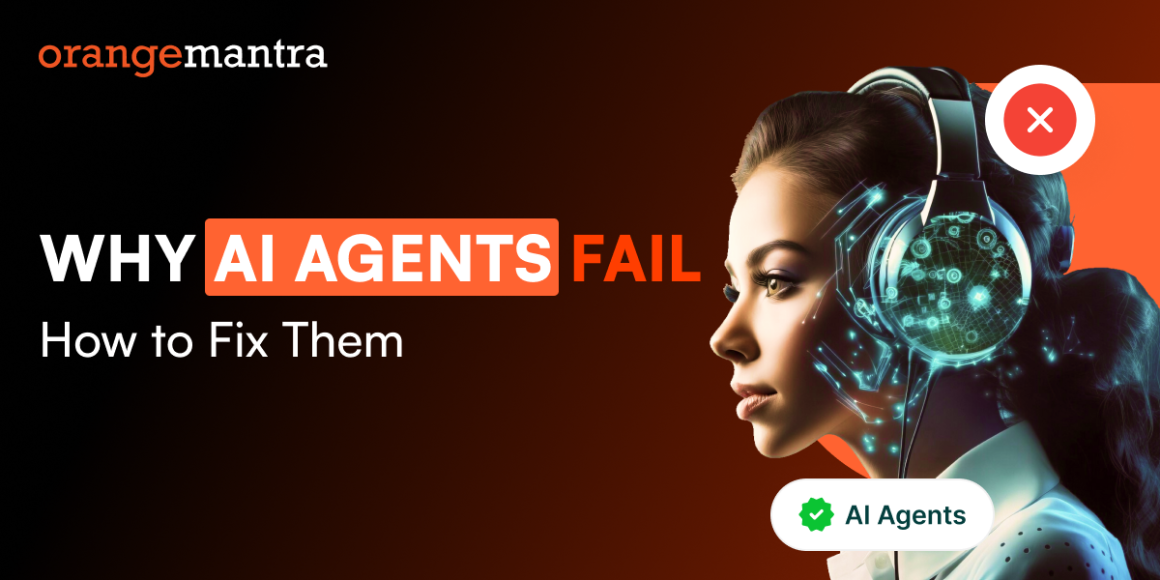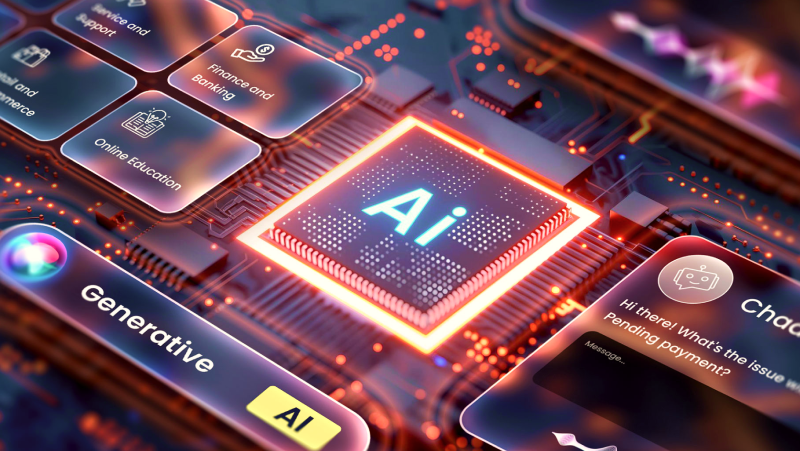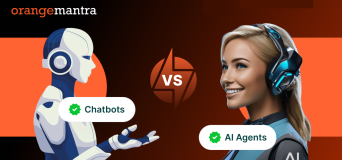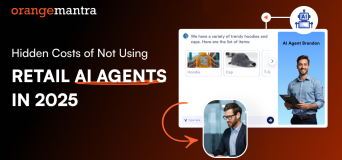Agents AI are autonomous systems designed to perform tasks with full precision having minimal human intervention. They have become advanced with the changing times but also understanding their failures is essential. For instance, at times, it happens that the agents offering financial advice might give outdated tax tips, or AI assistant might say an item in stock when it was discontinued months ago. All this misinformation ultimately led to frustration among customers.
It is important to know that failure in AI agents can have significant consequences especially in high stake environments. But with the right AI agent development solutions that can help in addressing issues and refine decision-making processes.
Table of Contents
Knowledge based agent in AI working simplifying workflows
AI agents are crucial in all industries now. They are highly programmed with reasoning and perception. The knowledge-based agent AI consists of facts and rules to make decisions and perform tasks. They not only handle specific tasks but also needed in complex tasks. Such as in cybersecurity, customer services, contextual understanding through NLP and so on.
What enables them in doing so is that they typically employ techniques such as knowledge representation, search algorithms, and inference engines to derive conclusions and act on them.
These agents are vital in automating decision-making tasks that let you scale operations without any difficulty.
- They ensure continuous operations as they can work around the clock without breaks.
- They are capable of automating repetitive without consuming increasing productivity.
- Processes large amounts of data in real time, enabling faster decision-making compared to humans.
- On top of that, a custom AI agent improves this by swiftly processing industry-relevant data with remarkable accuracy.
Despite their increasing sophistication, these agents are not infallible. To explore this further, keep reading.
Why do AI Agents Fail ?
AI agents to have come a long way in their capabilities, but they still face significant challenges in achieving optimal performance. This blog offers strategies like enhancing reasoning capabilities, optimizing tool usage, improving agent collaboration, and addressing these development and production hurdles to overcome these failures. Let’s go through it now.
AI is only smart as its data!
No matter what, these agents rely heavily on the data they are trained on, and their effectiveness is directly tied to the quality, accuracy, and relevance of that data. So, it is evident that if the data is flawed, biased, incomplete, or outdated, the AI’s decision-making will be compromised. Ultimately leading to failure.
Don’t be surprised when we say that it’s possible for even the most advanced algorithms can produce inaccurate or misleading results.
But why does this happen as you must be wondering! This is so because AI’s performance depends on data quality. Hence, AI struggles to reason, plan, and solve problems effectively.
Data Quality and Reliability: Why AI Agents Fail Without Data
- Biased data
Agents learn to be biased and give biased data as it has been initially trained with such data. For instance, a recruitment AI trained on data that overrepresents one gender may unfairly favor candidates from that gender. This shows discriminatory hiring practices.
- Data overshifting
It is when the agents in AI are trained too closely on the training data, it memorizes the past patterns that is not relevant now, rather than learn generalizable patterns. Stock market companies may incur losses when these agents rely on past trends and cause the predictions to fail.
- Mislabeled Data
It can be at times when AI trained on mislabeled data might mistake a dog for a cat, for example. So, data mislabeling is another challenge. This occurs when the labels and categories in the training data are incorrectly assigned. Ultimately, they learn incorrect associations and patterns.
- Lack of diversity in data
When the AI agents may not be able to perform well in diverse real-world environments. Suppose when a chatbot is trained from a specific region or language group, it might fail to effectively handle inquiries from users with different cultural or linguistic backgrounds.
- Scalability Issues
When these agents are asked to do more, deployed in larger, more complex environments, they often struggle to scale effectively. This can happen when too many customer queries are coming in together. Their performance can degrade due to limitations in processing power, memory, or model complexity.
Fixing AI Agent Issues
Because AI isn’t perfect, and neither are we when we try to make it work! It is about continuous improvement and a blend of many strategies when it comes to finding solutions to deal with the AI challenges. From confused reasoning to tool mishaps the challenges can be taken care of.
Avoid planning failures
You wouldn’t deny it when I say that planning is the key aspect. It’s crucial to keep many plans ready and when needed, adjust them. Firstly, breakdown the tasks into small chunks. Choosing the best plan out of all the choices and constant reflection on the plans is a must.
Fault tolerance
As said earlier, it is important to keep backups regarding plans. Even the best ones can fail. One agent isn’t always enough, deploy multiple agents to handle the same task. Keeping them ready to jump in whenever needed. To be on the safe side, multiple agents must be kept working in parallel or in standby mode, waiting to take over in case of failure.
Overcome development issues
AI agents need clarity and so it’s important to have clear goals and actions. As well as its necessity these agents have clear personas, because every agent needs a role to play and give them smart prompts. A well-crafted prompt is like giving directions. This ensures that agents don’t wander off course and waste resources.
Tackle with evaluation issues
Evaluating AI agents is tough. Unlike regular software, agents live in dynamic worlds that make performance metrics a guessing game. But you can evaluate them continuously by keeping tabs on agent performance, always. Whereas for real world testers, stimulators are good.
LLM Issues handled tactfully
Get the right prompts and hierarchical designs to help guide them. It’s important to give them the specialized specific prompts, whereas different agents must be allotted with different tasks and fine tune them to make them smarter. Furthermore, it is feasible to cut down costs by removing unnecessary data.
Boost Reasoning
To avoid reasoning failure, strong reasoning is a must because you know what can go wrong! Just like humans these agents need something that can boost the mind. So, use techniques like Reflexion to sharpen their minds. Also, human intervention is still needed to be included to train these AI agents alongside. Not forgetting it’s important to keep taking constant feedback.
The Role of AI Agent Frameworks in Avoiding Failures
AI agent frameworks can be regarded as a shortcut to smarter, more reliable agents. The frameworks are essential tools for developing more reliable, intelligent agents that help developers avoid common design mistakes. Let’s understand how.
- Have a structured design to implement these agents that have predefined architectures, templates, and patterns. Frameworks like OpenAI Gym or Google’s TensorFlow Agents and an AI agent builder can make it easier to create more sophisticated and reliable systems. This helps in avoiding common design mistakes and also reduces the risk of building agents that fail to generalize or adapt in real-world scenarios.
- Further, to prevent simple failures like misinterpretation of tasks, the Belief-Desire-Intention (BDI) model can be used in many agent frameworks. It facilitates more complex decision-making. Also, enables better reasoning and planning within agents. These agents can evaluate goals and available actions based on beliefs and desires.
- ROS (Robot Operating System) or Microsoft’s Bot Framework allow developers to define clear error-handling routines. Implementing this in error-handling mechanisms to ensure agents don’t crash or act unpredictably in the face of unexpected input or challenges. But rest assured, an expert AI agent development services, you can integrate these routines effectively to prevent agent failure.
- Frameworks often come with built-in simulation environments. Agents must be tested and evaluated in controlled settings before deployment. Frameworks like V-REP or Webots simulate real-world environments and identify weaknesses. Thus, minimizing the chances of failure post-deployment.
- Frameworks like Rasa for conversational AI allow you to adjust the NLP models, dialogue management, or integrate external APIs. That’s how you future-proof scalability. Showing that the components of the agents can be improved or replaced as needed.
In conclusion, fixing AI agent issues requires a combination of continuous improvement, strategic planning, and ongoing evaluation. Clear goals, well-defined roles, and smart prompts are essential to ensure AI agents perform at their best. Without these strategies, AI agents fail to meet expectations.
An AI agent development company specializes in addressing these challenges, so that these agents not only remain functional but are also reliable. Their expertise can guarantee the solutions to prevent your AI agents from failing, helping you achieve optimal performance every time.
FAQs
Q1.Why do AI agents fail to deliver as expected?
Without strong foundations, they struggle to make accurate decisions. Ultimately, AI agents fail because they lack proper planning, clear objectives, or are trained on biased data.
Q2. How can we fix our AI agent’s inability to scale?
Scaling issues occur when agents can’t handle larger workloads. The solution is building robust architectures, optimizing resources, and improving fault tolerance to ensure smooth scaling.
Q3. Why do AI agents struggle with dynamic real-world scenarios?
AI agents fail in dynamic environments because they can’t generalize well. Continuous learning, testing in varied scenarios, and feedback loops can help them adapt better.
Q4. What role does data quality play in AI agent failure?
Poor data quality, including bias or mislabeling, can lead AI agents to make incorrect predictions. Ensuring clean, diverse, and accurate data is key to successful AI outcomes.
Q5. How do we prevent AI agents from failing due to poor planning?
You can deal with it by breaking down tasks into smaller chunks, evaluating multiple strategies, and having backup plans in place.






